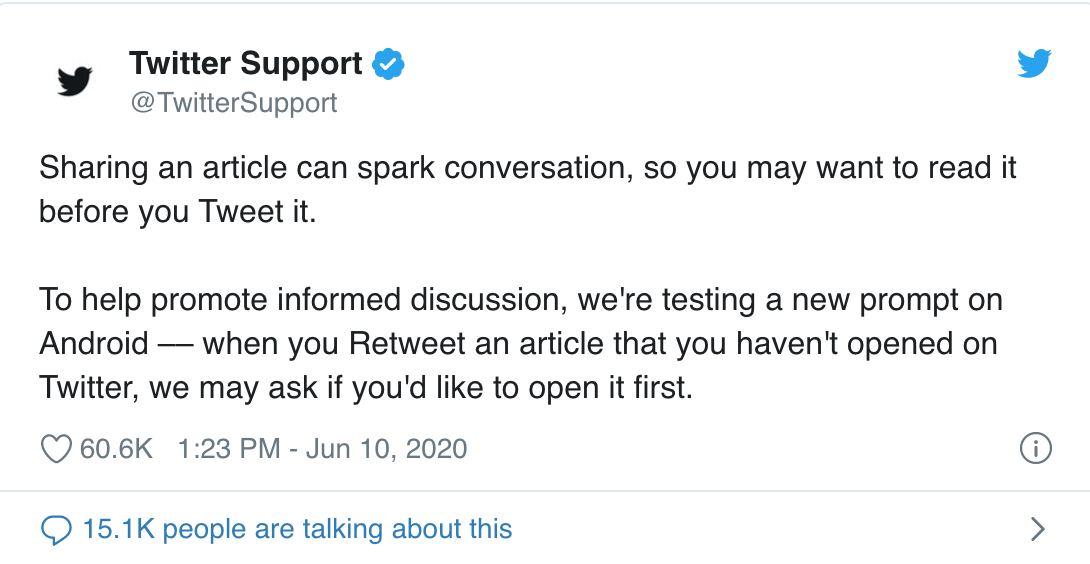Twitter is taking a stab at ensuring its users engage in meaningful conversations. “To help promote informed discussion,” Twitter is testing a new feature that will ask users if they really want to retweet a link they haven’t actually taken the time to read themselves.
This approach to accountability is one we haven’t seen before but the problem of users sharing links without reading them is not new.
- Back in 2013, Slate published an article, using information from Chartbeat stating:
“There’s a very weak relationship between scroll depth and sharing. [In general] articles that get a lot of tweets don’t necessarily get read very deeply. Articles that get read deeply aren’t necessarily generating a lot of tweets.”
- In 2016, computer scientists at Columbia University and Microsoft conducted a study and found that 59% of links posted on Twitter are never clicked.
- Also in 2016, a satirical and not at all factual “news” website posted an article with the headline, “Study: 70% of Facebook users only read the headline of science stories before commenting.” Even a quick look at the article reveals it’s made up almost entirely of lorem ipsum filler text but that didn’t stop it from being shared over 182,000 times.
What is it about certain articles that entice users to share them automatically? Part of the problem can be traced back to flashy headlines or “clickbait” (which I discussed in-depth in my last blog post). Oftentimes a headline is more likely to be spread if it seems to deliver the whole story in one bite-sized piece of information or delivers an emotionally charged message. Both are enticing because they are a quick way to legitimize your online presence.
We are all aware that our actions online are public and susceptible to scrutiny. Because of this, it can be tempting to share an article simply because the headline suggests an opinion or stance that resonates with you. Therefore, “sharing” the post without reading it is not an attempt to spread useful information but instead an attempt to signal the values of the person posting it. You appear smarter for having read the lengthy opinion piece in The New York Times in its entirety. Continue to post articles from them often enough and you’re even able to boast you subscribe to them. The pressure to appear smart on digital platforms goes hand in hand with appearing “woke,” a term that is often used to describe social-media activists. In today’s tumultuous political climate it is easier than ever to hop aboard and pledge your allegiance to a movement with very little research on your part and just a few clicks of the ‘retweet’ button. Otherwise known as the psychological term, virtue signaling:
noun
an attempt to show other people that you are a good person, for example by expressing opinions that will be acceptable to them, especially on social media
Now, this isn’t to say your opinions or emotions are inauthentic. You have every right to want to show support or spread good news in whatever way you see fit. But as we all know, sharing things online suggests you’re giving them your seal of approval and you don’t want to undermine your credibility by posting an article that concludes with, “Lorem ipsum dolor sit amet, consectetur adipiscing elit.”
Here’s what the new Twitter feature looks like in action. What do you think? Will
this sort of prompting help users rethink before they retweet?

Hailing from Las Vegas, Celeste began working with NISM as a summer intern in 2019. Since then she has found a real home in the community, earned her SMS certification, and currently works as the Social Media Coordinator for NISM and the Social Media Manager for OMCP. Celeste graduated from Saint Mary’s University of Minnesota with a B.A. in Acting & Communication for the Arts. Her passions have always included effective communication both on and off the stage and she is grateful that working remotely allows her the opportunity to pursue her acting career simultaneously. She currently lives in Los Angeles, CA with her wonderful husband and their three pets.
Feel free to connect with Celeste on LinkedIn.
Check out one of her other NISM blog posts: Battling Imposter Syndrome as a Social Media Professional




This is a great article, and shows the importance of reading articles before sharing, regardless of the headline. I am hoping this rolls out full steam and Twitter can do a study on the change in retweets, if any, based on this feature. It’s a good initiative and hope it’s effective.